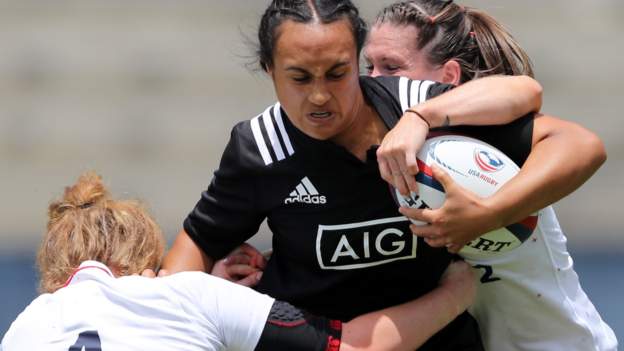
Teams qualified for the women's 2021 Rugby World Cup in New Zealand may have to isolate before the tournament.
Friday marks one year to go and organisers are confident the tournament will go ahead.
They are working with the New Zealand government on plans for 11 arriving teams, including England and Wales.
New Zealand's head of women's rugby development Cate Sexton said the build-up is "nerve-wracking with so much uncertainty".
The Rugby World Cup starts on 18 September 2021, with the final on 16 October.
Although there is no detail yet on how the isolation would work, New Zealand is hosting the America's Cup from December this year and the government has made provision for the yacht teams that are already arriving.
Speaking exclusively to BBC Sport, Rugby World Cup 2021 tournament director Michelle Hooper is confident the event will go ahead having worked at the last three men's Rugby World Cups along with other major global sporting events for football, sailing and triathlon.
Hooper helped plan Japan 2019 around typhoon season and New Zealand 2011 following the impact of the Christchurch earthquake, and is well equipped to deal with the impact of the coronavirus pandemic.
"It's not something that is new, unknown or unusual," she said. "I really hope it's a lot different in 12 months' time, but you just need to work with all the parties and say, 'Okay, this is what the plan looks like today'.
"As long as the teams are well informed they can build that into the schedules for 2021 and will have the best window to prepare with all the information they need."
The 2021 tournament will be the first Rugby World Cup for women hosted by a country in the southern hemisphere and Hooper talks of New Zealand's commitment to "supercharging the women's game".
World Rugby has already announced changes to the tournament schedule with the new format including quarter-finals for the first time and scrapping qualification matches.
The 50,000 capacity Eden Park will also become the first stadium to host a women's final having previously hosted two men's finals in 1987 and 2011.
Four star hotels for teams
Other changes off the field include stepping away from university campus accommodation that has been used in some form at the last three women's tournaments.
Hooper explains they've "taken a really big step up from 2017" and that all team hotels will be at least four star and are "geared towards looking after high-performance teams".
Many of them, like the Crowne Plaza in Auckland, were used by the likes of Australia's men in 2011 and by men's world champions South Africa in recent years.
The locations where countries base themselves will be determined after the draw on 20 November, with the match schedule following around a month later.
Unions and their players will view all the facilities via a "zoom site visit" as it remains unlikely anyone will be able to visit New Zealand before the tournament starts.
Hooper is keen to stress the significance of the country as host: "We know from the players themselves that playing the Rugby World Cup in New Zealand, it's the holy grail for rugby players, so it's a real honour."
Women's rugby TV boom
Pressure will be on the Black Ferns to be the first women's side to win the tournament on home soil. They will be the favourites to win as reigning champions and having won five of the previous eight titles.
Sexton knows there is a target on the Black Ferns' back: "It's something that we have acknowledged but it's a great challenge and something that we're excited about."
Interest in women's rugby is growing in New Zealand with several matches of their domestic competition - the Farah Palmer Cup - being broadcast by Sky NZ every weekend.
World Rugby is expected to announce a new global calendar for women's rugby later this month that will further benefit the Black Ferns.
Having previously not had a regular annual tournament to play in like the Six Nations, Sexton is hopeful the new calendar will be a real game-changer for New Zealand's women:
"You've got to see it to really believe it, with anything really and particularly women's sport. The more quality rugby people can view regularly, people will start to follow.
"Our minimum of Tests a year ideally would be eight, and, at least three of those at home. That would give us a really good calendar of games, in a way that we can get some great partnerships and sponsors behind."















 Phone: (800) 737. 6040
Phone: (800) 737. 6040 Fax: (800) 825 5558
Fax: (800) 825 5558 Website:
Website:  Email:
Email: 






